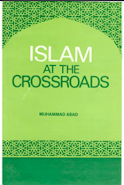"Islam at the Crossroads" - Muhammad Asad
"Islam at the Crossroads" is a significant work by Muhammad Asad, a prominent 20th-century Muslim scholar, journalist, and diplomat. Originally published in 1934 under the title "Islam at the Crossroads: On the Life and Thought of Muhammad Asad," the book addresses critical issues facing the Muslim world during a period of immense political, social, and intellectual transformation.
Asad's work is a reflection on the challenges and opportunities confronting Islam in the modern era. He examines the need for Muslims to engage with the rapidly changing world, emphasizing the importance of dynamic interpretations of Islamic principles in response to contemporary realities.
Scroll down for the book
Throughout the book, Asad advocates for a balanced and intellectually rigorous approach to Islamic thought, encouraging Muslims to reconcile their faith with modernity without compromising their religious values. He emphasizes the compatibility of Islam with scientific and intellectual progress, calling for a deeper understanding of the Quran in light of evolving knowledge.
"Islam at the Crossroads" also delves into political and social issues, discussing the importance of good governance, justice, and social welfare in an Islamic context. Asad argues for the establishment of societies based on Islamic principles, where justice, equity, and compassion prevail.
The book remains relevant today, offering valuable insights into the ongoing dialogue about the role of Islam in the modern world. Asad's nuanced perspectives continue to inspire scholars, policymakers, and individuals seeking to navigate the complexities of faith, tradition, and progress in contemporary society. This book "Islam at the Crossroads" first published in 1934, was written as plea to the Muslims of that generation to avoid a blind imitation of Western social forms and values, and to try to preserve instead their Islamic heritage which once upon a time had been responsible for the glorious many-sided historical phenomenon comprised in the "Muslim Civilization". But, as it happened, much of what the author had aimed at was subsequently misunderstood by the readers and leaders who failed to grasp the full implications of his call to cultural creativeness and to return to the true ideology of the Qur'an and Sunnah. This revised edition, it is hoped, would clarify something of the tragic confusion nowadays prevailing in the Muslim world. This is dedicated to the Muslim youth of today, just as the original 1934 edition was dedicated to the Muslim youth of those days.





No comments:
Post a Comment